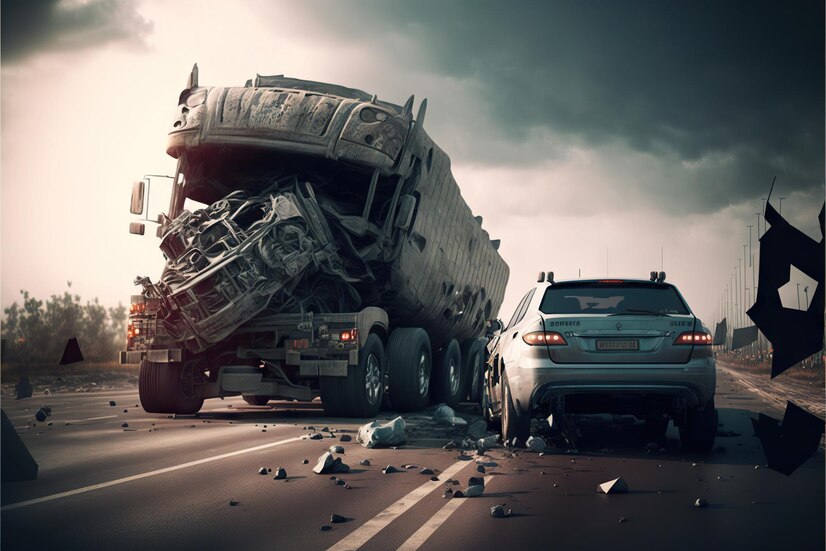Identifying Liability In Truck Accidents: Expert Advice From Long Island Attorneys
Published on: February 20, 2024
Last Updated on: May 9, 2024

toc impalement
In the aftermath of a truck accident, establishing liability can be a complex process with multiple factors and parties involved.
Expert attorneys from Long Island shed light on this often murky territory, providing insight into the role of federal regulations, the nuances of negligence, and the identification of responsible parties.
Navigating this intricate legal landscape requires not only a deep understanding of the law but also the expertise to gather and interpret the right evidence. The discussion that follows promises to equip you with the critical knowledge necessary for such a daunting endeavor.
Understanding Truck Accidents Basics
Delving into the basics of truck accidents, it is crucial to note that these incidents involve many complex factors, such as the vehicle’s size and weight, the driver’s expertise, road conditions, and applicable regulations, all of which significantly contribute to the severity and frequency of accidents. Consulting with a Long Island truck accident attorney can provide crucial insights into these factors and their implications on legal proceedings and compensation claims.
To further analyze, the scale of the vehicle directly affects the accident aftermath, often resulting in extensive damage and severe injuries due to the truck’s imposing mass and momentum. Equally, the driver’s proficiency is a pivotal determinant, where inadequate training or negligence can exacerbate the likelihood of accidents.
Moreover, road conditions pose a varying degree of risks. Factors such as inclement weather, poor road maintenance, or high-traffic zones may compromise a truck driver’s ability to maneuver safely, escalating the potential for mishaps.
The role of safety protocols is also indispensable in this context. These are designed to mitigate risks by enforcing guidelines on truck maintenance, load limits, and driver’s hours of service, among others. Non-compliance with these protocols can significantly increase the chances of accidents, underscoring their importance in maintaining roadway safety.
The Role Of Federal Regulations
A considerable number of federal regulations play an instrumental role in governing the operation of trucks on the roads, aiming to reduce accident rates and promote overall safety. These regulations are intricately designed to ensure Regulation Compliance by trucking companies and their drivers, thereby minimizing the likelihood of Regulatory Violations which could potentially lead to accidents.
The role of federal regulations in truck operations can be summarized in the following key areas:
- Driver qualifications: Regulations stipulate certain requirements for training and licensing of truck drivers, ensuring they are adequately skilled to operate such heavy vehicles safely on the roads.
- Hours of Service (HOS): These rules limit the number of hours a driver can operate a truck without rest, with the objective of preventing accidents caused by driver fatigue.
- Vehicle Maintenance and Inspection: Federal laws require regular and thorough inspections of trucks to ensure that the vehicles are in good working condition and safe for road use.
While these federal regulations have significantly contributed to road safety, non-compliance and regulatory violations by trucking companies and drivers still pose a considerable risk. This makes the role of federal regulations in truck accident liability a critical area of focus.
Negligence In Truck Accidents
In the complex landscape of truck accidents, negligence emerges as a pivotal factor often determining the liability for such incidents. The process of negligence determination involves a comprehensive examination of the circumstances surrounding the accident, from the driver’s actions to the condition of the vehicle and the road. Consulting with a Long Island truck accident attorney can be instrumental in navigating this intricate process.
First, it must be established that the truck driver owed a duty of care to other road users. This is typically a given, as all drivers are expected to drive carefully to prevent harm to others. Second, it must be shown that the driver breached this duty of care. Evidence such as traffic violation records, eyewitness accounts, and accident reconstruction can be instrumental in proving this point.
The third component of negligence determination involves demonstrating that the breach of duty directly caused the accident and the resultant injuries. Lastly, the victim must have suffered actual damages, either physical, emotional, or financial, due to the accident.
The compensation evaluation then follows, where the extent of the victim’s suffering is quantified in monetary terms. This involves assessing medical expenses, lost wages, and other accident-related costs. Importantly, it also considers non-economic damages such as pain and suffering, which can significantly increase the overall compensation amount.
Identifying Responsible Parties
After establishing negligence in a truck accident, the next critical step is to identify and ascertain the parties responsible for the incident. This process involves a thorough investigation and careful analysis of all the evidence. The outcome has significant insurance implications as it directly impacts the compensation claims of the victims.
The responsible parties in a truck accident can be varied and numerous.
These typically include:
- The truck driver, who may have been driving negligently or under the influence
- The trucking company, if it failed to enforce safety regulations or hired an incompetent driver
- The manufacturer of the truck or its parts, if a defect contributed to the accident
Identifying the responsible party or parties is a complex process requiring the expertise of seasoned attorneys. They meticulously dissect the circumstances surrounding the accident to uncover any violations of federal and state laws, contractual obligations, and industry standards.
Driver’s Liability In Accidents
Navigating the intricacies of a truck driver’s liability in accidents necessitates a deep understanding of the numerous factors at play, such as the driver’s behavior, compliance with regulations, and the condition of the vehicle at the time of the incident. Driver’s training is an essential element that influences the liability of the driver. Comprehensive training equips drivers with the necessary skills to operate their vehicles safely, thereby playing a critical role in accident prevention. Conversely, inadequate training or non-adherence to training protocols can increase a driver’s liability in the event of an accident.
Behavioral factors such as fatigue, distraction, or impairment also contribute significantly to a driver’s liability. If it is established that the driver was non-compliant with regulations regarding rest periods, or was driving under the influence of substances, their liability could be significantly increased.
The condition of the truck is another crucial determinant of the driver’s liability. Regular maintenance checks can prevent unforeseen mechanical failures that may cause accidents. Hence, failure to ensure that the vehicle is in a roadworthy state could result in the driver being held accountable for any resulting accidents.
Trucking Company’s Liability
While the driver’s actions and the condition of the vehicle are pivotal in determining accident liability, the role of the trucking company cannot be overlooked, as their responsibilities and actions significantly influence the likelihood and outcome of such incidents.
Companies are expected to ensure the safety of their operations, a task that involves proper vehicle maintenance, thorough driver training, and adherence to traffic regulations.
The trucking company’s liability can be investigated by looking at several key areas:
- The company’s adherence to maintenance schedules and safety checks, which is crucial to avoid vehicle malfunctions leading to accidents.
- The quality and regularity of the driver training programs they provide, to ensure drivers are equipped with the necessary skills and knowledge for safe driving.
- Their compliance with federal and state laws, such as Hours of Service regulations designed to prevent driver fatigue.
Insurance implications arise when trucking companies fail to meet these standards, potentially leading to sizable payouts for damages. Furthermore, liability loopholes can complicate matters, as companies might attempt to avoid responsibility by blaming the driver or the vehicle manufacturer. Therefore, establishing a company’s liability necessitates a detailed and comprehensive investigation.
Manufacturer’s Liability Explained
In addition to the responsibilities of drivers and trucking companies, manufacturers of commercial vehicles also bear a significant degree of liability in the event of accidents. This liability arises when a truck accident is attributed to defective components or when the vehicle involved has been subject to product recalls.
When defects in the truck’s design, manufacturing, or materials contribute to an accident, the manufacturer can be held liable under product liability law. For instance, if the accident is caused by a faulty braking system or a tire that ruptures under normal use, the manufacturer of these components may be held responsible.
Similarly, product recalls are another area where manufacturers carry the burden of responsibility. If a truck was involved in an accident and had previously been recalled for a safety-related defect that was never fixed, the manufacturer could be held liable for the accident.
In essence, manufacturers have a duty of care to ensure their products are safe for use. When they fail to meet this responsibility, and it results in a truck accident, they can be held accountable. Understanding the role of manufacturer’s liability is crucial in the comprehensive analysis of truck accidents.
Government Entities And Liability
Beyond manufacturers, government entities can also bear significant liability in truck accidents, particularly when poor road conditions, inadequate signage, or flawed traffic control measures contribute to the incident. This is often referred to as municipal negligence, where the government fails to create or maintain safe conditions for trucking and other traffic operations.
Several factors can contribute to this form of negligence:
- Poor Roadway Conditions: Potholes, unmarked speed bumps, and insufficient lighting can lead to accidents. Truck drivers depend on clear and well-maintained roads to perform their duties safely.
- Inadequate Signage: Improperly placed or missing signs can cause confusion or unexpected conditions for truck drivers, potentially leading to accidents.
- Flawed Traffic Control Measures: Ineffective traffic lights or poorly designed intersections can also contribute to accidents. A lack of proper traffic control measures can create hazardous situations for trucks due to their size and weight.
In such cases, identifying the role of government entities in truck accidents requires an analytical approach. Determining liability involves evaluating the extent of municipal negligence and its impact on the accident. It’s important to work with experienced attorneys who understand the intricacies of these cases to ensure that the victims receive the justice they deserve.
Evidence Gathering Tips
To successfully establish liability in truck accident cases, diligent and strategic evidence gathering is paramount. This process should encompass not only the collection of physical evidence but also the utilization of photographic evidence and witness interviews.
Photographic evidence can be an extremely persuasive tool in any litigation process. It can accurately depict the accident scene, vehicle damages, and any visible injuries sustained. This tangible record counters any arguments that may distort the true circumstances of the incident. Thus, preserving photographic evidence, even those captured on personal mobile devices can prove to be invaluable.
Additionally, conducting witness interviews promptly following the accident is crucial. Witnesses can provide unbiased third-party narratives that can clarify the sequence of events and identify potentially liable parties. Their testimonies can affirm or challenge the claims made by the involved parties. However, memories can fade over time, and the details can become blurred. Therefore, capturing these accounts as soon as possible is essential.
Navigating Legal Processes
Navigating the legal processes following a truck accident can be a complex endeavor. An understanding of accident litigation is crucial to comprehend the legal actions and potential consequences that may result.
Furthermore, knowing the essentials of legal documentation can provide an advantage in terms of providing solid evidence and strengthening one’s case. For specialized assistance in this area, consider consulting with truck accident attorneys at Cohen & Jaffe, LLP to leverage their expertise and resources for a more favorable outcome.
Understanding Accident Litigation
The intricate legal processes involved in accident litigation often necessitate a keen understanding of liability laws, particularly in the context of truck accidents. It is critical to grasp how the accident aftermath can significantly influence the litigation timeline.
The process encompasses several critical steps:
Initial Investigation: Right after the accident, evidence is collected to determine fault.
Claim Filing: A claim is filed against the insurance company of the party at fault, marking the start of the litigation process.
Resolving the Claim: The claim can be resolved through various means such as negotiation, mediation, arbitration, or going to trial.
Understanding these stages is crucial to navigate the complexities of accident litigation effectively. Each stage requires different strategies and approaches, underscoring the need for expert legal advice.
Legal Documentation Essentials
Embarking on the legal journey of truck accident litigation requires a thorough understanding of the essential legal documents involved, each serving a specific purpose in the process. The application of Document Organization Strategies becomes crucial to manage the voluminous paperwork. Structured and categorized documents foster quick retrieval, aiding in building a strong case.
In this legal battlefield, the Importance of Timelines cannot be stressed enough. Timelines provide a chronological sequence of events and are instrumental in establishing causality. They play a pivotal role in determining the Statute of Limitations, a critical factor that could potentially make or break the case.
Understanding the ins and outs of legal documentation is vital. It not only helps in navigating the complexities of the legal process but also strengthens the plaintiff’s position.
Hiring The Right Attorney
In the aftermath of a truck accident, securing competent legal representation is a critical step towards ensuring your rights are protected and your interests advocated for effectively. This process, referred to as attorney selection, requires careful contemplation and evaluation of several key factors.
- Experience: The attorney should have a proven track record in handling truck accident cases. Their experience would equip them with the knowledge and skills necessary to navigate the complex legal landscape surrounding such incidents.
- Reputation: A good reputation in the legal community can be indicative of the attorney’s competence and professionalism. This can be assessed through client testimonials, peer reviews, and professional ratings.
- Legal fees: A clear understanding of the fee structure is crucial to avoid any surprises down the line. Some attorneys work on a contingency basis, where they only get paid if they win your case, while others might charge an hourly rate or flat fee.
Hiring the right attorney can significantly impact the outcome of your case. Therefore, it is essential to consider these factors during the attorney selection process. This will ensure that the lawyer you choose is well-equipped to secure a favorable resolution for your case.
Frequently Asked Questions
What Are The Common Causes Of Truck Accidents On Long Island?
Common causes of truck accidents on Long Island often involve truck maintenance negligence and driver fatigue issues. Poorly maintained vehicles and overworked drivers significantly contribute to the frequency of these accidents.
How Does The Process Of Filing A Truck Accident Claim Differ From That Of Car Accidents?
The process of filing a truck accident claim differs from car accident due to claim processing differences and specific truck accident legislation. These involve complex factors such as multiple liable parties and federal regulations.
How Does Insurance Factor Into Truck Accident Cases?
In truck accident cases, insurance plays a critical role. Policy analysis is essential to understand coverage limits and exclusions. Insurance influences claim settlement amounts, liability determinations, and potential payouts for damages or injuries sustained.
What Are The Potential Long-Term Impacts Of A Truck Accident On The Victim’S Life?
Long-term impacts of a truck accident on a victim’s life can be substantial, including enduring psychological trauma and significant rehabilitation costs, affecting their emotional well-being and financial stability over an extended period.
How Can A Truck Accident Victim Ensure Their Rights Are Fully Protected During The Legal Process?
To ensure rights are fully protected, truck accident victims should seek professional victim support and legal assistance. Understanding legal challenges and navigating complex procedures can be effectively managed with expert legal advice and representation.
Read Also:






















Comments Are Closed For This Article